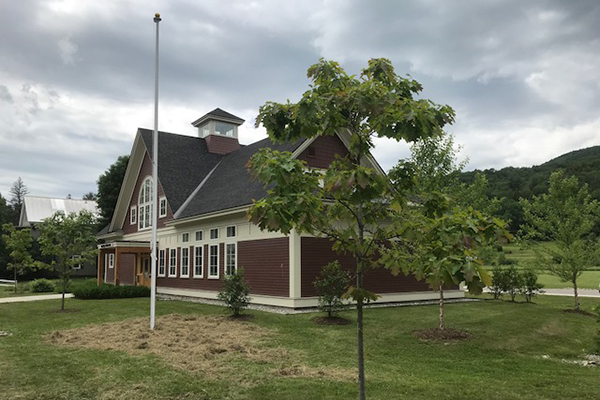While a consultant made recommendations on how Waitsfield should proceed with its water/wastewater study and implementation plans, singling out several options from seven studied, the select board approved a more general motion calling for developing a scope of work that identifies funding scenarios.
The board, at its December 5 meeting, met with Jon Ashley, of Dubois and King Engineers as well as members of the towns water and wastewater committee.
Select board member Chach Curtis provided context for Ashley’s presentation, noting that the state-funded water/wastewater feasibility study was now 90% complete and include cost estimates for the scenarios identified in the 60% report as well as recommendations.
“Infrastructure does not happen quickly. This is the first step in a multi-year process. And how do we pay for this? Once we construct something it should last 40 years or 30 years. Tonight, we’re going to ask the select board to authorize a subset of the committee to work with Jon to determine the scope, cost and time of the next phase,” Curtis said. He also serves on the water/wastewater committee.
He said the timing is right to get on the state’s radar to get a local project a priority rating which would translate to more funding for the engineering process.
“Our timing is good given the level of funding that’s out there,” Curtis added.
SCENARIOS
Ashley reviewed the alternatives that have been identified. Scenario 1 is to do nothing. Scenario 1A would to prioritize flows from lots that have limited areas and parcels without fully compliant state-permitted systems. That would mean identifying lots where replacing failed or failing systems so see if that wastewater could be accommodated in the existing systems.
Scenario 2 would prioritize connecting properties with private wells in Irasville and the village to the town’s water system, removing well shields and potentially freeing up suitable soils for in-ground wastewater systems. Scenario 2A would extend the town water system south to Kingsbury Road in parallel with a sewer collection system build-out which gains further suitable soils by getting rid of more well shields.
Scenario 3 calls for increasing disposal capacity at existing leach fields in well-suited soils within the study area, adding advance pre-treatment systems at Mad River Green Shops and Waitsfield Elementary School to maximize potential increases in treatment capacity.
Scenario 4 calls for developing community wastewater systems on one or more sites, including the Munn site immediately north of Kingsbury Road.
Scenario 5A calls for developing community systems at the Munn site, Mad River Green Shops, and Waitsfield Elementary School. Finally, Scenario 5B identifies developing wastewater capacity at the Munn site as well as an unidentified site north of the village. Ashley said a site at the former Spaulding farm property near Center Fayston Road had been discussed.
He provided a slide showing costs for the various options ranging from $0.36 million to $21.9 million, with potential users ranging from 101.9 to 935.2 and annual operating costs ranging from $43,243 to $154, 854.
RECOMMENDATION TO PROCEED
“Our recommendation is to proceed with a preliminary engineering report for planning and design of 5B and 2. The preliminary engineering report should include phasing of the build-out, starting with scenario 4 and 2 and engage landowners at Mad River Green, Waitsfield Elementary School and THE Spaulding property in a discussion to seek permission for testing and surveying of these potential treatment and disposal sites for inclusion in full build-out of scenario 5B,” Ashley said.
“Then solicit community input from landowners in the study area regarding current and near future interest in connecting to a community wastewater system and pursue funding opportunities to facilitate the affordability of constructing a new community wastewater system,” he continued, and suggested that more funding might be available if the town were to do an income study of the area to be served.
After a few questions, the board passed the following motion:
MOTION
To authorize the wastewater and water feasibility study committee to work with Dubois and King to develop a scope of work for the wastewater and water project preliminary engineering report, as well as the associated loan application, to be brought back to the select board for review and approval at a future meeting.
Next steps include a December 12 public information hearing and later in December a final report from Dubois and King. Between December and January, the select board will make a decision on moving forward with the preliminary engineering report and environmental documentation.
The preliminary engineering report and environmental documentation are due in February to be on the state’s 2024 funding list. Final design of the system and public hearings would take place in 2023 and 2024 with a bond vote slated for Town Meeting 2024.













